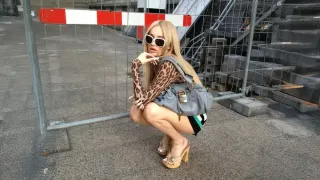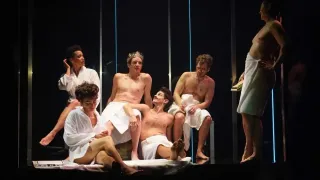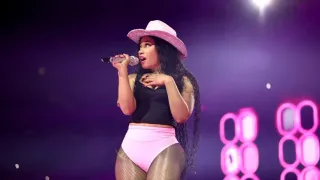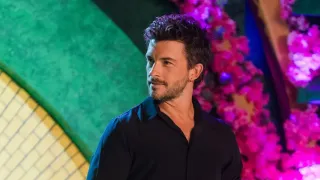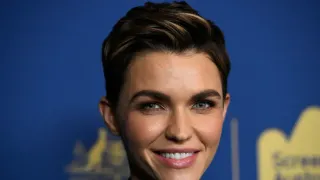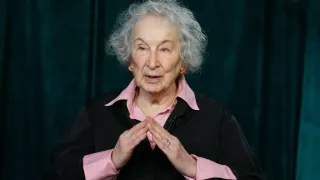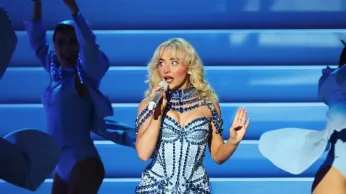
6 hours ago
Sabrina Carpenter’s Wonderland: Pop Royalty, Queer Joy, and a Musical Reboot That Could Change Hollywood
READ TIME: 4 MIN.
If you’ve been waiting for Hollywood to hand queer communities a fresh slice of magic—with a side of pop stardom—Sabrina Carpenter’s latest move down the rabbit hole just might be the invitation you’ve been craving. The Grammy-nominated star is set to headline and produce a new Alice in Wonderland musical for Universal Pictures, a project she personally pitched over a year ago, complete with her own lookbook and vision for the iconic story . Not content to merely star, Carpenter is taking the reins behind the scenes, signaling her evolution from Disney darling and Broadway lead to full-fledged Hollywood tastemaker.
Directing the trip is Lorene Scafaria—whose 2019 film Hustlers was lauded for its fierce female ensemble and sharp social commentary—while musical film mogul Marc Platt (La La Land, Legally Blonde) will produce alongside Alloy Entertainment’s Leslie Morgenstein and Elysa Koplovitz Dutton .
Lewis Carroll’s Alice in Wonderland has always been more than a children’s fantasy. The original tale—full of dizzying logic, surreal characters, and the ever-present challenge to “be yourself in a world that wants you to be anything but”—has long resonated with LGBTQ+ audiences. In queer circles, Alice’s journey is often read as an allegory for coming out, self-discovery, and finding chosen family in a world that doesn’t always make sense . Carpenter’s version, drawing directly from Carroll’s text and not just Disney’s sanitized adaptation, is set to bring those themes to the fore in a way that feels pointedly relevant in 2025 .
For queer viewers, the Wonderland motif—where “nonsense makes the most sense”—echoes a lived experience of navigating systems that can feel arbitrary or hostile, and carving out spaces for joy, expression, and kinship. Carpenter’s “pop-forward sensibility” promises to update this for a generation raised on TikTok, meme culture, and the unapologetic reinvention of identity .
Carpenter is not just riding the wave—she’s generating it. Her recent six Grammy nominations, including Album of the Year and Best Pop Vocal Album for Man’s Best Friend, along with Song and Record of the Year nods for “Manchild,” underscore her dominance in pop music . Her sold-out arena tour, including six shows at Los Angeles’s Crypto.com Arena and five at Madison Square Garden, further cements her status .
Carpenter’s Broadway chops—she starred as Cady Heron in Mean Girls before the pandemic shuttered its run—give her a unique edge in bringing musical storytelling to the big screen. LGBTQ+ theater fans will recognize the significance of her crossing over from stage to screen, especially in a project helmed by a director known for centering complex, rebellious women .
Wonderland has always been a space where “impossible things” are possible. For queer audiences, it’s a metaphor for finding authenticity, crafting new realities, and surviving the absurdities of societal expectation. Carpenter herself has spoken about her passion for the story and her desire to create a version that is both whimsical and grounded—a space where “being different isn’t just accepted, it’s celebrated” .
While specific casting details are still under wraps, the creative team’s track record—Scafaria’s work with LGBTQ+ talent in Hustlers, Platt’s history with boundary-pushing musicals, and Alloy Entertainment’s commitment to diverse storytelling—suggests a project where queer representation won’t be an afterthought .
The significance of Carpenter’s dual role as star and producer cannot be overstated. For LGBTQ+ artists, the ability to shape narratives—rather than just perform them—is key to breaking cycles of exclusion and stereotype. Carpenter is joining the ranks of young artists pushing for creative control, signaling to queer and marginalized creators everywhere that their stories, visions, and leadership matter .
The collaboration with Lorene Scafaria, whose Hustlers was praised for its portrayal of female solidarity in a flawed system, hints that the new Alice may be less about conformity and more about revolutionary play. For musical fans—especially those who see themselves reflected in the camp, wit, and emotional depth of the genre—this project could mark a turning point .
As Carpenter’s Wonderland heads into production, the LGBTQ+ community will be watching closely—not just for the spectacle, but for the possibility. Will this be the musical that finally gives queer fans their own “Through the Looking Glass” moment, where surreal adventure meets real affirmation? Will the cast and soundtrack reflect the diversity of the audiences who have kept Alice alive for generations? The buzz is real, and the stakes are high.
In an industry still learning how to listen to queer voices, Carpenter’s leap—from pop star to creative architect—offers a vision of Wonderland not as escapism, but as blueprint. For LGBTQ+ viewers, this is more than a movie. It’s a signal that the days of being written out of the narrative are ending. And just as Alice finds herself in a world where up is down and nonsense rules, Carpenter’s Wonderland reminds us: sometimes, the most radical thing you can do is simply to be yourself.
Stay tuned—because in Carpenter’s Wonderland, every rabbit hole leads somewhere fabulous.
